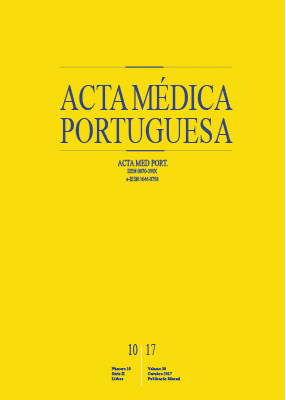Building a Maternal and Newborn Care Training Programme for Health-Care Professionals in Guinea-Bissau
DOI:
https://doi.org/10.20344/amp.8453Keywords:
Education, Continuing, Guinea-Bissau, Health Promotion, Infant Health, Maternal Health, Quality of Health Care, Staff DevelopmentAbstract
Introduction: The Integrated Programme of Maternal and Child Health aims to reduce maternal and child mortality in Guinea-Bissau. The purpose of this article is to share our experience in building a training programme on maternal and newborn care for health-care professionals in Guinea-Bissau.
Material and Methods: Regional directors of the four target areas chose a group of staff who provide prenatal and childbirth care to attend the course (12 to 15 trainees per region). In each region, 15 highly interactive and practical sessions were scheduled over eight weeks. The trainees’ summative and reactive assessment was obtained using a multiple choice questionnaire (final test) and an anonymous survey, respectively.
Results: Attendees included 25 nurses, 17 midwives and 14 doctors. About two thirds had five years’ practice or less. Test median scores were higher among trainees with two to nine years of practice (54.4% to 60.9%), as compared to those with a year or less (47.8%) or 10 or more years (45.7%). Pedagogical variables were rated as ‘good’ or ‘very good’ by 91% to 95% of the attendees.
Discussion: Use of an interactive and practical pedagogical methodology produced positive results and was crucial to tailoring the training to local needs. However, adapting the syllabus according to professional categories and experiences should be considered.
Conclusion: Our results warrant further development and evaluation of training programmes on maternal and neonatal care in Guinea-Bissau.
Downloads
Downloads
Published
How to Cite
Issue
Section
License
All the articles published in the AMP are open access and comply with the requirements of funding agencies or academic institutions. The AMP is governed by the terms of the Creative Commons ‘Attribution – Non-Commercial Use - (CC-BY-NC)’ license, regarding the use by third parties.
It is the author’s responsibility to obtain approval for the reproduction of figures, tables, etc. from other publications.
Upon acceptance of an article for publication, the authors will be asked to complete the ICMJE “Copyright Liability and Copyright Sharing Statement “(http://www.actamedicaportuguesa.com/info/AMP-NormasPublicacao.pdf) and the “Declaration of Potential Conflicts of Interest” (http:// www.icmje.org/conflicts-of-interest). An e-mail will be sent to the corresponding author to acknowledge receipt of the manuscript.
After publication, the authors are authorised to make their articles available in repositories of their institutions of origin, as long as they always mention where they were published and according to the Creative Commons license.









